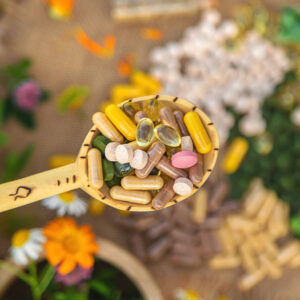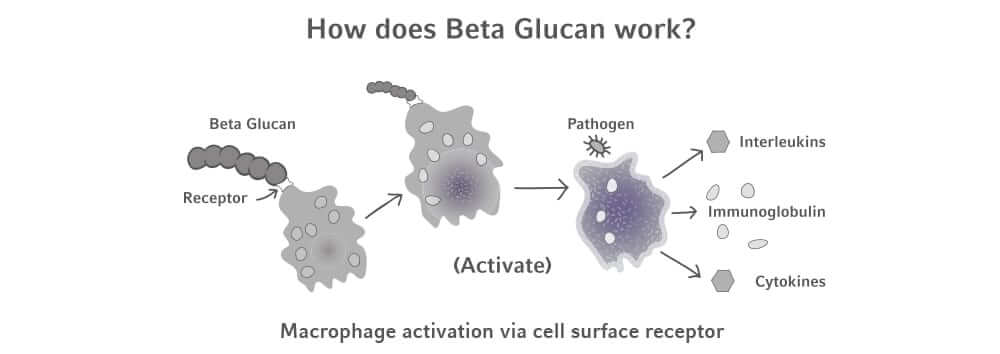Table of Contents
Medicinal mushrooms contain countless molecules with proven therapeutic qualities, such as polysaccharides, dietary fibres, terpenes, etc. The group of polysaccharides includes beta-glucans (β-glucans), bioactive compounds with proven activity on the immune system. These compounds regulate our immune response and are also involved in the functioning of the cardiovascular system and the oncological process.
According to published scientific evidence, beta-glucans are capable of effectively stimulating our defences against bacterial infections, viruses, parasites, etc. They also act as biological response modifiers by modulating the host’s immune response, which has implications for protection against various diseases.
What are Beta-glucans
Biochemically, beta-glucans are long chains of glucose units found in many substances and are considered soluble dietary fibres. Although most oat-based products have been associated with beta-glucans, these are not exclusive to oats, but can be found in other cereals, algae and mushrooms. More specifically, beta-glucans of fungal origin have bioactive potential and their structural aspects with complex branching resulting in triple helix formations, which is linked to their anti-tumour activity.
Where can I find Beta Glucans naturally?
Beta-glucans are present in a variety of natural foods. As well as basidiomycetes such as Sun Mushroom, Lion’s Mane, Cordyceps, Coriolus versicolor, Reishi, Shiitake, Maitake, Coprinus and Polyporus, they are also found in certain cereals such as barley, oats, rye, maize and rice. Seaweed is another important source of beta-glucans. These different options offer a variety of foods with which to incorporate the benefits of beta-glucans into a balanced diet.
Beta-glucans and mushrooms: a special case
Beta-glucans from mushrooms and certain cereals have special chemical qualities. They have β-(1,3) bonds in their main chain and have β-(1,6) branching points. Various studies have determined that this branched structure is of interest for its action on the immune system.
Analyses of the species cultivated at Hifas da Terra show a beta-glucan content of close to 50%
Other structural aspects relevant to beta-glucan activity are:
- solubility: the higher the solubility, the higher the activity.
- molecular size: the higher the molecular weight, the more activity can be observed.
- branch points: branch points of type β-(1,6).
- branched form: the tertiary helical structure of fungal glucans is important for their immunostimulant activity. In contrast, algal beta-glucans have a linear structure.
How are beta-glucans activated?
As we have seen, beta-glucans are part of the food we eat daily, although they can also be consumed in the form of food supplements, where the concentration of these active substances is higher. In all cases, they are usually administered orally, which leads us to the following question: what are the different functions of beta-glucans?
BETA-GLUCANS: Modifiers of the biological response
The mechanism of action of beta-glucans in modulating the biological response involves their interaction with specific receptors present on immune cells, in particular macrophages. When beta-glucans are ingested, they are recognised by receptors such as dectin-1 on the surface of macrophages.
Once recognised, beta-glucans activate these receptors, triggering a series of intracellular signalling pathways. This activation leads to the production and release of various immunomodulatory molecules, notably cytokines and chemokines. These molecules play a crucial role in regulating inflammation, enhancing the immune response and promoting tissue repair and regeneration.
In addition, beta-glucans may also indirectly influence immune functions by promoting the growth and activity of beneficial intestinal bacteria. This interaction with the intestinal microbiota may further improve immune function and overall health.
The different function of beta-glucans
Allies of the intestinal microbiota
Beta-glucans can have several positive effects on the gut microbiome, and the micro-organisms that live in your intestines. Some of the possible effects of beta-glucans on the microbiome include:
– Prebiotics: certain beta-glucans function as prebiotics.
In other words, they act as food for the beneficial bacteria present in your intestines.
– Regulation of bacterial diversity: beta-glucans can influence the diversity of bacterial species in the intestinal microbiota. Increased bacterial diversity is generally associated with better intestinal health and a lower risk of certain diseases.
– Strengthens the intestinal barrier: by improving the integrity of the intestinal wall, beta-glucan can reduce intestinal permeability and prevent health problems associated with a weakened intestinal barrier.
– Anti-inflammatory properties: Some beta-glucans have anti-inflammatory properties and can help reduce inflammation in the intestines.
Immune modulation by the microbiota
70 to 80% of immune system cells are located in the intestinal mucosa. Along with the nostrils and skin, this is one of our main routes of access and contact with pathogenic organisms. The location of immune cells in the digestive system also allows orally administered beta-glucans to be captured and transported to the spleen, lymph nodes and bone marrow where, by interacting with immune cells, they can help activate the immune response.
Mushrooms also act as prebiotics, stimulating the growth of intestinal microbiota, which is beneficial for the body.
Beta-glucans and allergies
In addition to the anti-tumour effects, there are also studies on beta-glucans evaluating the effect of this type of polysaccharide on allergies and their associated symptoms: from rhinitis, conjunctivitis, itchy eyes and throat and runny nose to coughing, fatigue and physical discomfort.
When an allergic reaction occurs, our body increases its defensive response. From the usual balance, also known as homeostasis, we move into an exacerbated Th2 immune response or pro-inflammatory state where various chemical reactions occur, including the release of histamine, which can cause the symptoms previously mentioned.
A study published in 2013 by the journal Food Science & Nutrition reports the results of a randomised trial conducted over 4 weeks in which the experimental group was given a formula containing beta-glucans. Compared with the placebo group, subjects who consumed beta-glucans reported the following improvements:
– Overall, allergic symptoms were reduced by 28%.
– The severity of associated symptoms was reduced by 52%.
Impact on general wellbeing
In terms of general well-being, the experimental group also saw an improvement in emotional well-being, physical health and energy levels. In terms of the reduction in symptoms associated with allergic processes, the following can be cited:
- Insomnia was reduced by 53%.
- a 57% reduction in symptoms affecting the eyes and their mucous membranes (watering, redness, itching, etc.).
- problems such as itching, excess mucus and other nose-related problems have been halved (post-nasal drip, itching, sneezing, congestion, etc.).
The combination of these improvements resulted in a 56% improvement in quality of life for these allergy sufferers.

Dyslipidaemia, hypertension and obesity
The functional use of dietary fibre has been reported in numerous studies. Several scientific articles have even documented the benefits of beta-glucans in specific areas linked to cardiovascular health, such as dyslipidaemia, hypertension and obesity.
As we have already mentioned, the water solubility and molecular weight of beta-glucans are determining factors in their activity on the immune system, which is also linked to their cardiovascular action and, in particular, their cholesterol-lowering effect.
This brief summary of beta-glucans gives us an idea of the therapeutic potential of the foods that contain them, but also of the possibilities that these substances offer for the development of new treatments aimed at looking after our health and, in particular, improving our immune and cardiovascular systems.
Compounds studied in oncology
The ability of beta-glucans to stimulate immune system cells such as macrophages, neutrophils and NK cells has led to new clinical applications in which they are already being used as adjuvants to improve the efficacy of hospital treatments, particularly because of their anti-cancer potential.
Numerous studies remain to be carried out; some support the idea that beta-glucans could prevent oncogenesis and, given their effect on immune cells, beta-glucans may also inhibit tumour growth and expansion in vitro.
Finally, beta-glucans have the potential to reduce the side effects of chemotherapy by supporting immune function and alleviating inflammation, but further research is needed to confirm their efficacy and safety in this context. At Hifas da Terra, we are studying our formulas to assess the benefit of fungal extracts on the quality of life of breast and colorectal cancer patients.
Are there any side effects?
As the “Cancer Immunology Immunotherapy” journal reports, beta-glucans, particularly those found in mushrooms rich in beta-glucans, are generally well tolerated by most people.
Regarding interactions with cancer treatments, no clear evidence of a negative interaction between β-glucan and cancer treatments has been provided. At Hifas da Terra, our fungal extracts have been independently studied for their interactions with liver cytochromes. The study concluded that the risk of interaction was low. However, further studies are needed to confirm these results before any definitive conclusions can be drawn.
Note also that beta-glucans can affect blood sugar levels. Caution should therefore be exercised when combining with other food supplements that affect blood sugar levels.
By following these recommendations, you can get the most out of your beta-glucans while minimising the potential health risks.
We hope this brief summary of beta-glucans highlights both the therapeutic possibilities of using beta-glucan rich food sources, and beta-glucan supplements in the development of new health treatments focused on improving the immune and cardiovascular systems.
We recommend

Nootropics for Female Emotional Balance and Hormone Regulation
An exploration of natural remedies tailored for hormonal regulation and emotional well-being, particularly focusing on female-specific supplements.

Tiredness and Fatigue? How to Combat Seasonal tiredness
Asthenia, also known as fatigue, is a common symptom. It becomes abnormal when it is not regulated by rest. We analyse this phenomenon.
- Akramiene D, Kondrotas A, Didziapetriene J, Kevelaitis E. (2007) Effects of beta-glucans on the immune system. Medicina (Kaunas). 43(8):597-606.
- Shiu-Nan Chen, Ching-Sheng Chang, Ming-Hsin Hung, Sherwin Chen, William Wang, Cheng-Jeng Tai, Chung-Lun Lu (2004) The Effect of Mushroom Beta-Glucans from Solid Culture of Ganoderma lucidum on Inhibition of the Primary Tumor Metastasis. Evid Based Complement Alternat Med. 252171.
- D. El Khoury, C. Cuda, B. L. Luhovyy, and G. H. Anderson (2012) Beta Glucan: Health Benefits in Obesity and Metabolic Syndrome. Journal of Nutrition and Metabolism Article ID 851362, 28 pages.
- Deepak Mudgil (2017) Dietary Fiber for the Prevention of Cardiovascular Disease (chapter 3) Fibers Interaction Between Gut Micoflora, Sugar Metabolism, Weight Control and Cardiovascular Health. Pages 35-59.
- Chan Y, Chang T, Chan CH, Yeh YC, Chen CW, Shieh B, Li C (2007) Immunomodulatory effect of Agaricus blazei Murill in Balb/cByJ mice. J Microbiol Immunol Infect. 2007;40:201–208.
- Vighi G, et al. (2008) Allergy and the gastrointestinal system. Clinical and Experimental Immunology, 153 (Suppl. 1): 3–6.
- Solomon P. Wasser, Alexander L. Weis (1999) Medicinal Properties of Substances Occurring in Higher Basidiomycetes Mushrooms: Current Perspectives (Review). DOI: 10.1615/IntJMedMushrooms.v1.i1.30. Pages 31-62.
- Mendel Friedman (2016) Mushroom Polysaccharides: Chemistry and Antiobesity, Antidiabetes, Anticancer, and Antibiotic Properties in Cells, Rodents, and Humans. Foods, 5(4), 80
- John A.Bohn, James N., BeMiller (1995) (1→3)-β-d-Glucans as biological response modifiers: a review of structure-functional activity relationships. Carbohydrate Polymers. Volume 28, Issue 1, Pages 3-14.
- Chan GC, Chan WK, Sze D (2009) The effects of beta-glucan on human immune and cancer cells. J Hematol Oncol. 2009 Jun 10;2:25. doi: 10.1186/1756-8722-2-25.
- Jayachandran M, Xiao J, Xu B (2017) A Critical Review on Health Promoting Benefits of Edible Mushrooms through Gut Microbiota.Int J Mol Sci. 2017 Sep 8;18(9). pii: E1934. doi: 10.3390/ijms18091934.
- Takashi Norisuye (1985) Triple‐stranded helical structure of schizophyllan and its antitumor activity in aqueous solution. Supplement: Microsymposium of Polymer Effects.Volume14, Issue S19851.Pages 105-118.
- Talbott, S. M., Talbott, J. A., Talbott, T. L., & Dingler, E. (2014). β-Glucan supplementation, allergy symptoms, and quality of life in self-described ragweed allergy sufferers. Food science & nutrition, 1(1), 90–101.
- Barton, Claire, et al. “Beta-glucan contamination of pharmaceutical products: How much should we accept?.” Cancer immunology, immunotherapy 65 (2016): 1289-1301.


